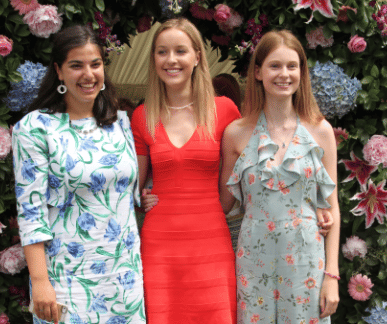In the latest of her regular education columns for the Times, Samantha Price, Headmistress at leading girls’ boarding establishment Benenden School, urges young people to have confidence in their own abilities and gifts
HAVING reached the end of another year, and sent another group of young people into the world, it is time to once again consider what it is we hope they have taken away from their education.
During the course of the academic year we benefit enormously from listening to a wealth of speakers. One was particularly memorable this year.
Having informed the girls that he had not been a high flyer at school, and had rarely listened or remembered anything that was said during years of assemblies (not such a strong message!), he said the one thing he had taken away with him from school was that you have a responsibility to use the talents you have to the full, and to ensure that you use these beyond school to make a positive contribution. A strong message indeed.
The abundance of talent I see on a daily basis honestly never ceases to amaze me.
Within this school community, and many others across the area, are strong intelligent young people brimming with potential to leave school and not only develop their talents further in a myriad of professional landscapes, but also to have a voice in tackling the real issues our society faces: They can be leaders of tomorrow.
However, nobody would say this is – or indeed is going to be – easy, and navigating the workplace and the other pressures we face as a society takes confidence and resilience, particularly for women, even in 2017.
I invite you to consider why it is that when we receive feedback from a teacher or, as an adult, from our line manager, where 37 great things are listed along with one opportunity for growth, we dwell on the latter?
It tends to be out of a fear of not being good enough, a desire to be seen to be perfect, a fear of not being accepted or worthy enough to truly connect with other people if they see us as we really are: If they see the authentic self. This is a vulnerability which can hold us back.
Brené Brown, an American scholar, strongly argues that there are two types of people: Those who have a deep sense of worth and those who don’t. Those who do have the courage to be who they are and to be imperfect.
That courage enables them to show compassion to themselves, to put themselves out there, to develop their visions, to manage the challenges and deal with the failures, and thereby recognise their responsibility to themselves – and therefore others – to get out there, use their talents, contribute and make a difference.
Without the willingness to accept one’s imperfections, we too easily fall into the vulnerability trap of only developing ourselves as far as we feel safe for that fear of failure, or being found out.
To my mind, this is one of the single most important factors we need to keep considering in preparing young people, and women in particular, to not only meet the challenges of our times, but to place them in a position to have the confidence to be those really positive contributors to our society – which they are equipped and talented enough to do.
I urge young people to have the confidence and the self-belief to go on and make a significant difference. Do not worry about being perfect – what honestly does perfect look like? But rather celebrate being who you are – and strive to be the very best version of that self.








